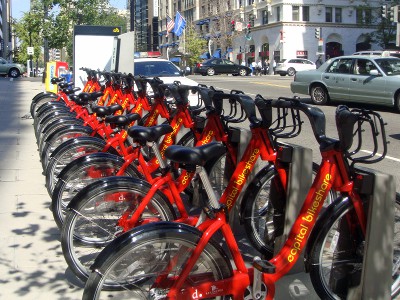
 A new report from the Mineta Transportation Institute, part of San Jose State University’s College of Business, presents a somewhat counter-intuitive finding regarding the number of deaths related to the spread of bike-sharing services in the United States in recent years.
A new report from the Mineta Transportation Institute, part of San Jose State University’s College of Business, presents a somewhat counter-intuitive finding regarding the number of deaths related to the spread of bike-sharing services in the United States in recent years.
“The growth of bikesharing in the United States has had a transformative impact on urban transportation,” write the study’s authors. “Major cities have established large bikesharing systems, including Boston, Chicago, Denver, Minneapolis-Saint Paul, New York City, Salt Lake City, the San Francisco Bay Area, Seattle, Washington DC, and others. These systems began operating as early as 2010, and no fatalities have occurred within the US as of this writing.”
No fatalities.
More than 35 million trips taken and zero fatalities, which while remaining true so far in the United States, the report hastens to mention two fatalities in Canada and one in Mexico, which is kind of incredible when you consider how absolutely terrifying Mexico City’s traffic situation is compared with the relative orderliness of Canadian roadways.
As an enthusiastic user of Bixi in both Montreal and Toronto, I can admit that while I was pleased to see that Mexico City had a bike-sharing program, I couldn’t be persuaded to actually ride one on the open road, convinced that D.F.’s motorists would have made short work of me.
The report, titled “Bikesharing and Bicycle Safety”, examined data from Capital Bikeshare in Washington, D.C., Nice Ride in Minneapolis-St. Paul, and Bay Area Bike Share in San Francisco.
In New York City, which opened its Citi Bike program to riders in May 2013, more than 24 million trips have been made using the city’s 7,500 bikes.
Rides taken in New York City topped 50,000 per day at the system’s busiest points last year, which contributed to 2015’s total of more than 10 million rides, a 24% improvement over 2014’s more than eight million rides.
New York’s Citi Bike system was initially developed by Bixi, the Montreal bike-sharing service that exported its particular model of bicycles and solar-powered stands to London, Boston and Melbourne, Australia before questions regarding the appropriateness of the Montreal city government’s involvement in what had effectively become a manufacturing and exporting business caused the spinning off of Bixi into its own non-profit company, which posted an $800,000 surplus in 2014 after a financially rocky initial couple of years.
By contrast with bike-sharing systems, though, which until now have had the luck of producing no U.S. fatalities, the study’s authors also reported fatality and non-fatal injury rates for the U.S. between 1999 and 2003 to be 21 per 100 million trips and 1,461.2 injuries per 100 million trips, respectively.
Which makes bike-sharing safer even than riding your own personal bike, at least statistically.
Another study referenced by the report demonstrated an injury rate in British Columbia of 1,398 police-attended injuries per 100 million trips spanning from 2005 to 2007.
The report also speculates on some of the unquantifiable reasons that bike-sharing may be safer than riding a private bicycle or just walking down the street in an American city without being shot, statistically speaking.
The report’s authors think that perhaps the bicycles’ designs, which are sturdier than 10-speeds, may steer riders towards a more cautious approach, while also pointing out that almost no riders of bike-sharing systems wear helmets.
Statistics tend to bear out that helmets aren’t much of a factor in preventing cycling fatalities, while most experts insist that the health benefits of having more people riding bicycles far outweigh the risks posed by helmet-less riding.
“Helmets, like seatbelts in cars, mitigate the severity of injuries when a collision does occur, but they do not prevent the collision from occurring,” write the study authors.
In cities like Seattle and Vancouver, where helmet wearing is the law, many are openly questioning whether those laws ought to be repealed on the grounds that they constitute a barrier to entry for potential cyclists and bike-share riders, who may not bother riding at all if helmet laws prevent them.
It’s worth remembering, given this report’s findings, that when bike-sharing programs started popping up, there was no end of pearl clutching and hang-wringing editorials speculating on the dangers posed by more bicycles on the road piloted by inexperienced cyclists who refused to wear helmets and insisted on just blowing through every stop sign as if the roads were made with them in mind.
War on the car, anyone?
For a little perspective, it’s refreshing to revisit a rant delivered by Wall Street Journal editorial board member Dorothy Rabinowitz on the eve of the launch of New York City’s bike-share program, directed at then-mayor Michael Bloomberg.
Leave a Reply
You must be logged in to post a comment.



 Share
Share Tweet
Tweet Share
Share




Comment